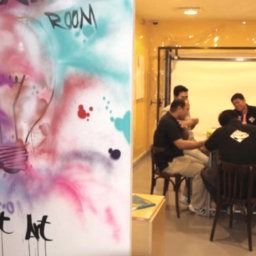
Anecdotal evidence suggests escape room games started in Japan, as puzzle-based computer games. Their live escape room equivalents are very similar. However, they typically focus more resources on developing an engaging theme or storyline. Today, enterprises of all types and sizes recognize the need to focus resources on nurturing teamwork and fostering clear, effective communication. As such, escape room games are emerging as a savvy option that engages participant’s attention and immerses them in a fun experience.
The Escape Room Concept Explained
An escape room concept is a timed game usually around 60 minutes in duration. A team comprising of up to 10 players are “locked” in a room full of puzzles. They must discover fiendishly clever clues concealed in the room clues and use their wits, guile, and hopefully teamwork, to escape within the allotted time.
The escape room style puzzles vary by style and their degree of difficulty. Most involve a combination of visual clues, hidden objects, code cyphers, mathematical problems, and different forms of work scrambles. While the primary objective is to always open the door, some rooms require the team to figure out other elements such as the “whodunnit” solution in a crime-themed room scenario.
Part game, always part-theater and performance art, part team-building exercise, escape rooms are taking off around the world. Their growth has been explosive. With the number of permanent rooms world-wide going from zero at the start of 2010 to at least 2,800 today.
Why Escape Room Games?
Escape room games are successfully feeding a taste for real-life diversion that tech-addicted millennials can enjoy together with family, friends, colleagues, and even strangers. This reflects a growing consumer demand for social play experiences that are live and unique and can’t be repeated. Immersive entertainment is emerging as the next frontier of team building activity, the future of team play spaces.
The studios behind Tom Cruise’s upcoming “Mission: Impossible” film erected escape rooms at AMC Theaters enabling fans to become IMF agents. Free tickets for those rooms sold out in New York, San Francisco, and Los Angeles in less than 24 hours. Later in July, the Science Channel is debuting their very own version of an escape room-themed game show titled “Race to Escape.”
Psychology In Motion
Escape room games remove the player from the stresses and strains of the real world. Thus, allowing participants to immerse themselves in a new universe. These games aren’t just about facilitating participants’ escapes from the room. Escape room games are about escaping from the everyday and immersing oneself in the moment.
Psychologically, the intent is to induce a mental state where participants are working against the clock under periods of spasmodic pressure. The emphasis is on a purely unself-conscious flow. Participants become focused and fully immersed in the activity. Successes produce a rush, while frustrations naturally crackle and spark.
The overarching objective of the game is for a team to make it out of the room in one hour. The ticking clock will challenge their teamwork and range of skills to solve puzzles, answer riddles, and collect clues as they progress on their way to solving the mystery, unlocking the room.
A Range Of Immersive Experiences
Some escape room games comprise little more than a scattering of tables with pens and paper. Others upscale escape rooms involve elaborately decorated sets and sublime technical wizardry.
Pioneering themes include “The Detective” a detective’s office straight out of a 1940s noir film, “The Cavern” where participants explore a lost civilization, “The Theatre” a room haunted by ghosts, and “The Alchemist” where players have to find the mysterious philosopher’s stone.
Still, other high-tech escape rooms have adopted pressure-sensor floors and motion-triggered lasers. These, create a “Mission: Impossible” vibe and amp up the atmosphere. Another escape room concept called “The A.I.” uses a robot to provide hints to participants.
Right now, the trend is for high-tech sophisticated puzzles, original design flourishes, and exciting stories. These emergent escape room themes reflect the desire by many customers to discover an out-of-the-norm diversion, where collaboration is key.
Each room is accompanied by a costumed actor to help manage the time, provide instructions and prod players who find themselves stuck and desperately need a hint to regain their momentum.
Players enjoy having an experience that doesn’t involve staring at a screen or a computer monitor. The interactive nature of the experience lends itself to team building exercises as well as private play.
Meeting New Challenges
Escape rooms in their current format are interesting both as a form of entertainment and in providing an excellent vehicle for nurturing teamwork and communication. However, moving forward, both need to continue to make the escape room concept interesting and engaging.
Quality is the key as in so many other aspects of team play. A lackluster plot with mediocre performance support has the potential to disappoint players. These market forces brought escape rooms under pressure to deliver not only a vibrant, dynamic environment combining theatrical panache and a storyline with a soul but also to ensure their execution maintained a level of professionalism.
The different themes, intriguing challenges, and rooms will give you the feeling that you are actually part of a video game. The escape room games are a perfect way to spend an hour with friends, family, as well as colleagues. This will test your teamwork capabilities, wit and intuition, and the amount of fun you can have by playing.
Made For Millennials
Escape rooms’ biggest catchment is millennials, which experience to date indicates account for about 40 percent of participants. Millennials are continuously looking for alternative entertainment to their established entertainment options such as the cinema, bowling, and karaoke. Millennials comprise adults’ aged 18 to 34 and are at the forefront of the experience economy. Thus, escape room-based games are perfectly positioned to capitalize on their momentum.
Unlock The Secrets To Team Productivity And Enhanced Teamwork Today!
Nurturing teamwork and clear communication is the key to building a high performing organization.
Book an escape room and unleash your team’s potential NOW!
Final Word
The emerging popularity of escape rooms is clear evidence people are looking for a new type of experience. In most escape rooms, clues lead to a physical key. However, the story of why you’re in the room and the way the action unfolds differs by room and location. Finding the hidden clues and solving their riddles is a great test of your lateral thinking and problem-solving skills!
















